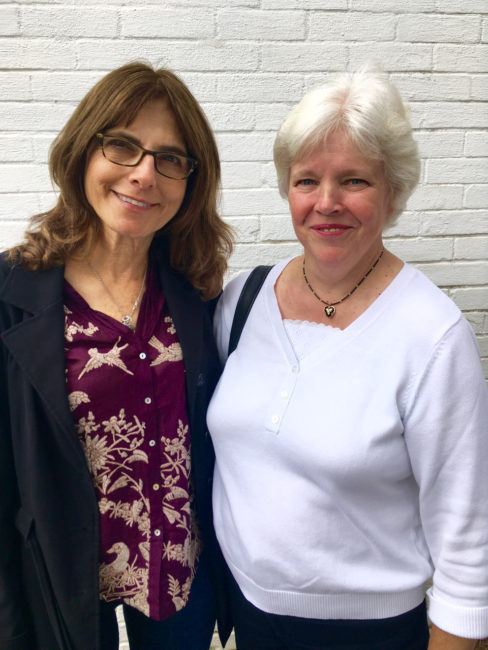Reconnecting
There we are in 1959, or thereabouts. From left to right, that's me, Carol's cousin (long since deceased) and Carol. I had never seen this photo until she sent a print of it to me just a few years ago, tucked into a letter...and I have absolutely no memory of the day. Carol tells me it was taken at her house, and we were going to a birthday party, which would explain our fancy garb. (I'm crazy about my skirt...looks like I was feeling very festive.)Carol was my first friend, the child who taught me that there were kids (other than siblings) with whom you could play. We both lived on Coney Island Avenue, both went to P.S. 179, both went to St. Mark's (she recruited me) and we were inseparable. We played with dolls, made up stories, got into our share of mischief. People often ask me: how did you get back in touch with your childhood friend? My answer is that we never entirely lost touch. I moved away when I was about twelve, but we have been exchanging Christmas cards, birthday cards, and little notes every year since...and that's a lot of years!
I have seen a succession of pictures like stepping stones of Carol's son from kindergarten through all the grades, right up to his wedding day. Lately there are occasional pictures of her two grandchildren. Carol doesn't do email, Facebook, or "any of that"– she's oddly old-fashioned and skeptical of such things – all her correspondence, fifty years' worth, involves paper, pen, and the U.S. Postal Service.
Carol has been through a divorce or two, followed by a long and loving relationship that ended with her partner's death about a decade ago. Recently she's taken up with a fellow named Pete who has a motorcycle repair shop near the office where she has worked as a secretary for thirty-four years, located on the main street of a small town in upstate New York. Carol is stable and consistent; she knows who she is and where she stands.And I was going to be in the area, more or less. How could I not want to see my first friend? We estimated our arrival time and found the address easily, a simple brick building with a green awning near a hair salon and a banquet hall. We pulled open the street level door.
There she was, so fundamentally familiar to me. I saw the same prettiness I remembered, the same blue smiling eyes. She talked to me in a casual way, as if we'd seen each other just the week before.But our journeys have been so different. Carol stayed in Brooklyn through the 1970s and doesn't view it, as I do, through a lens of sentiment and nostalgia. It got rough for a while. She talked about crime, danger, racial violence in school. She was happy to move upstate. Now, though, she admitted that this town too had seen better days. It looked shabby, shops closed up, houses in disrepair, poverty around the edges. "It's drugs," was her assessment.
It felt like the early 1980s in her office, with an IBM typewriter, old computer monitors like big beige boxes, and stacks of yellowish file folders. She's brisk and efficient, at ease in the realm. Someone hurries in and drops off the papers for a closing that's scheduled at two. She takes a quick phone call and jots down a message for her boss. Carol works hard, and she's a good person. I could see that. People count on her.
"So you really live on a ranch?" she asked. We sat in the coffee shop across the street from her office eating sandwiches cut into triangles and served on paper plates alongside a little pile of potato chips. "With cattle and horses? You've gone away about as far as you can go from where we grew up."
It's true. In many ways I have. And I suspect that there isn't much in my life these days that Carol would relate to. Most of our conversation had to do with childhood escapades, and even some of these could not be confirmed. I seem to have a penchant for colorful detail and elaborate narrative. I began to wonder how much of my past I have invented.
"She was always like this," said Carol affectionately, turning to Monte.
Outside, a tattered flag drooped from a storefront and a trash can lay on its side by the curb. A school bus dropped off three children whose mother escorted them back across the street, then resumed idly sitting with a companion on the porch of her house. There was a Trump sign on someone's front yard, mute testimony to the toxic anger that has infected millions. My first friend lives in this town, but I don't know what she thinks about all that. I'm not even sure I want to.
We have just enough time to go over to the motorcycle shop and meet Pete, a thin shy man with a gray beard who looks at Carol proudly. I'm so glad I made this trip to visit her. But even as we hug goodbye, I realize how unlikely it is that I will see her in person again.
The cards will continue. The memories will endure.

